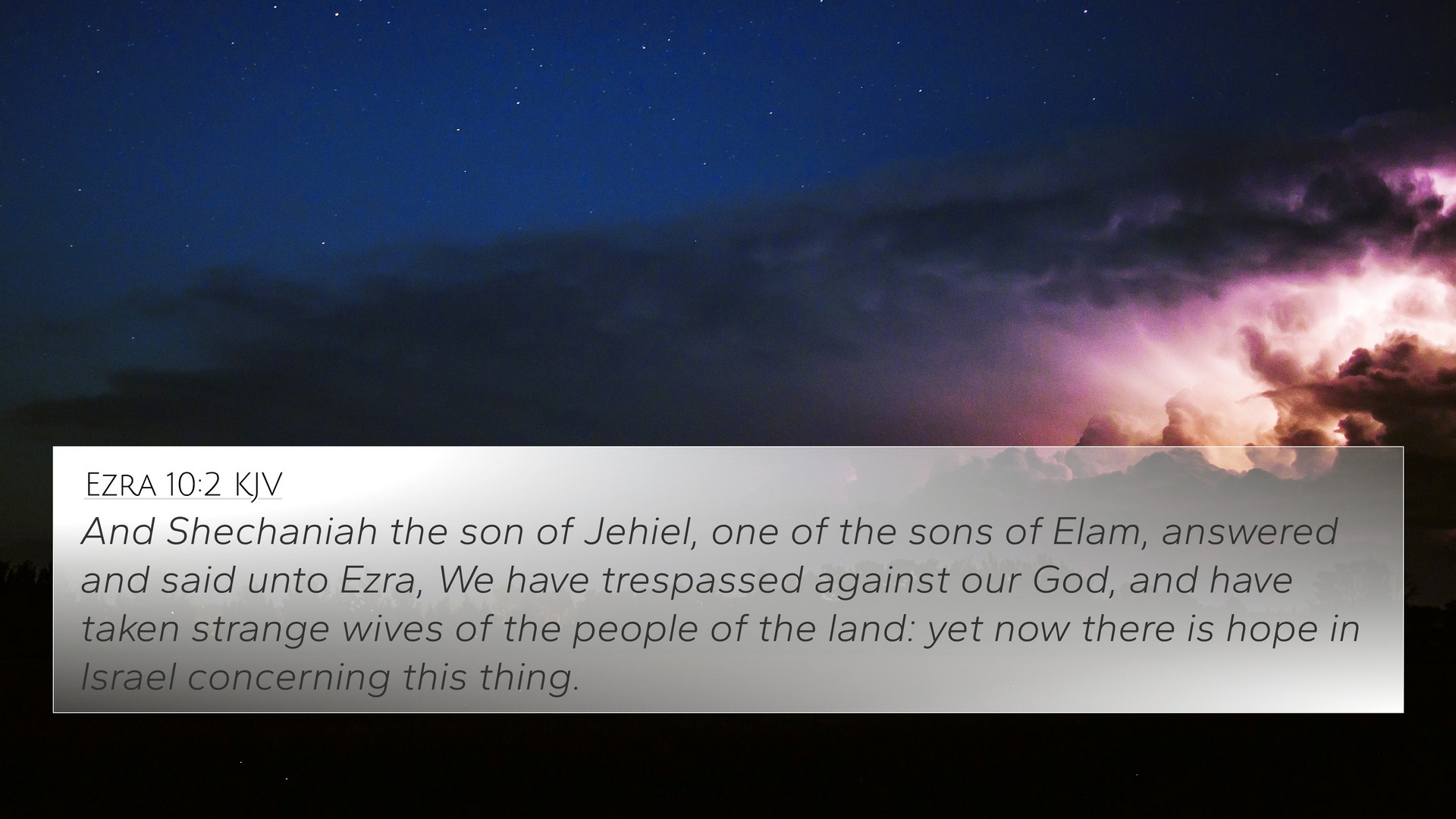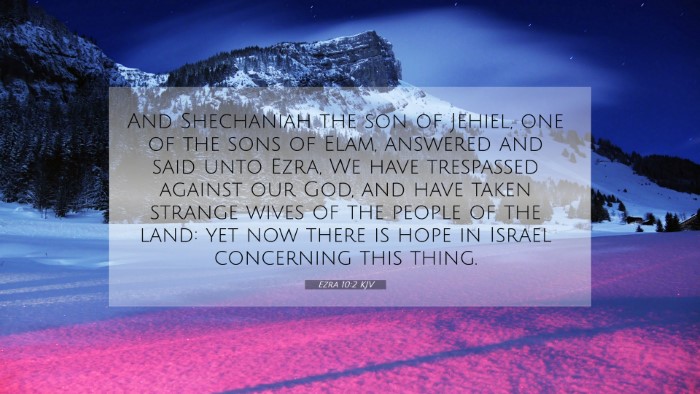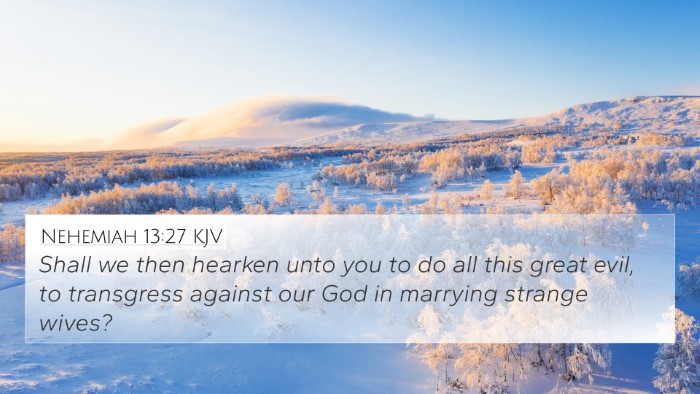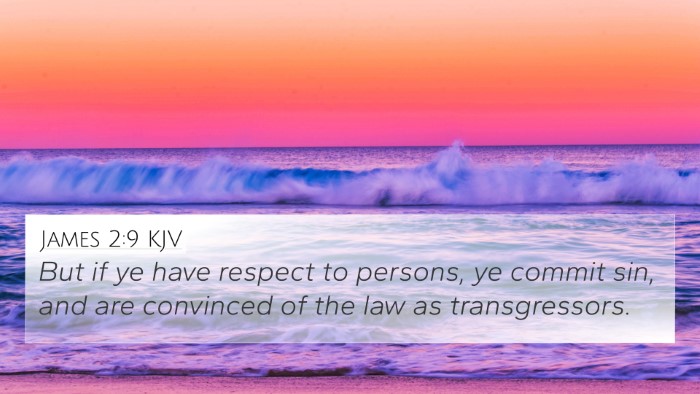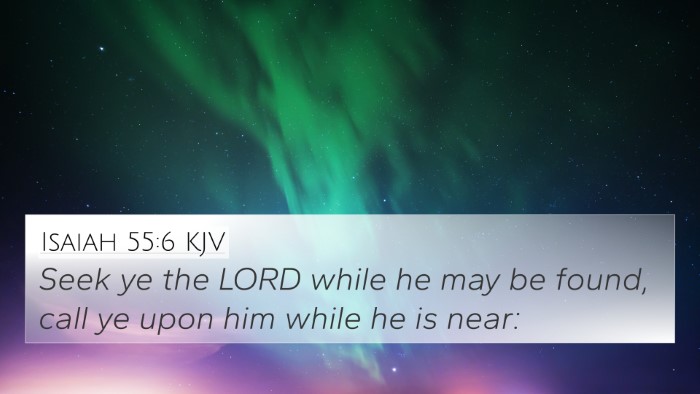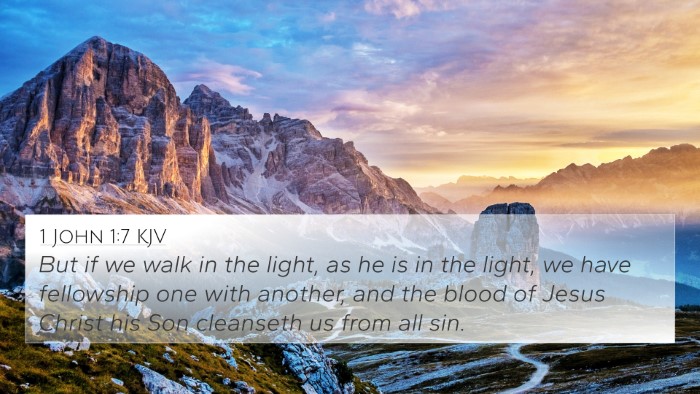Understanding Ezra 10:2
In the book of Ezra, chapter 10, verse 2, we encounter a significant moment wherein the people of Israel confront their unfaithfulness. The verse reads:
"And Shechaniah the son of Jehiel, one of the sons of Elam, answered and said unto Ezra, We have trespassed against our God, and have taken strange wives of the people of the land: yet now there is hope in Israel concerning this thing."
Summary of Ezra 10:2
This verse captures a poignant admission of guilt and the hope for restoration. The speaker, Shechaniah, acknowledges the sin of intermarriage with foreign peoples, which was a breach of God's commandments. Despite this transgression, he emphasizes the possibility of redemption and renewal for the community of Israel.
Commentary Insights
Below are insights from noted public domain commentaries regarding this verse:
- Matthew Henry: Henry underscores the communal acknowledgment of sin as an essential step towards repentance. He notes the significance of Shechaniah's role in leading the people to confess their sins openly, highlighting the importance of accountability in spiritual matters.
- Albert Barnes: Barnes provides context on the nature of the transgression, explicating that the union with foreign wives was seen as a violation of the covenant relationship between God and Israel. He identifies Shechaniah's statement as a catalyst for collective action toward reconciliation with God.
- Adam Clarke: Clarke offers a detailed account of the societal implications of these marriages, suggesting that they threatened Israel's identity and their relationship with God. He emphasizes Shechaniah's declaration of hope, portraying it as a pivotal moment of transition from despair to potential restoration.
Bible Cross References
Ezra 10:2 connects with various other verses, enhancing our understanding through a network of scriptural insights. The following are notable cross-references:
- Deuteronomy 7:3-4: God commands Israel not to intermarry with nations, citing the potential spiritual dangers involved.
- Nehemiah 13:23-27: Similar issues of intermarriage arise, further illustrating the longstanding struggle of the Israelite community with this specific sin.
- Ezra 9:1-2: Preceding verses where Ezra mourns the people's unfaithfulness also highlight the need for accountability.
- 2 Corinthians 6:14: New Testament echoes of the Old Testament call for holiness show that believers are still cautioned against unequal yokes.
- Malachi 2:11: This verse addresses the faithlessness displayed in marriage, reinforcing the covenantal context of relationships.
- Romans 11:1-2: Paul discusses God's fidelity to His covenant, analogous to Israel's hope for restoration through confession.
- James 4:8: A call for purification mirrors the communal effort sought in Ezra to return to God.
Thematic Connections
In examining Ezra 10:2 and its related verses, we uncover thematic connections that transcend both the Old and New Testaments. These themes include:
- Restoration: The idea of returning to God after sin.
- Community Repentance: The collective nature of repentance is a recurring element within the Israelite narratives.
- Covenant Faithfulness: The call to remain faithful to God’s commandments and the enduring consequences of disobedience
- Hope and Redemption: Even in acknowledgment of sin, there remains a thread of hope for restoration.
Conclusion
Understanding Ezra 10:2 through the lens of these commentaries and cross-references enriches the reader's grasp of Biblical themes relating to sin, repentance, and the hope available through God's covenant. By exploring connections between various Bible verses, we gain a deeper insight into the overarching narrative of redemption present throughout Scripture.
Tools for Bible Cross-Referencing
For those interested in further exploring Biblical connections, utilizing resources such as a Bible concordance or a Bible cross-reference guide can provide invaluable assistance. Here are some tools and methods:
- Bible Chain Reference: A method of linking related verses through a thematic approach.
- Cross-reference Bible Study: Techniques that focus on comparing scriptures to highlight relationships.
- Comprehensive Bible Cross-reference Materials: Look for guides that provide extensive lists of verses grouped by themes.
- Identifying Connections: Learn how to use different versions of the Bible to see varied interpretations and related verses.
Exploring cross-referenced themes in the Bible not only deepens understanding but also enhances personal study and sermon preparation, ultimately fostering a richer relationship with the Scriptures.
